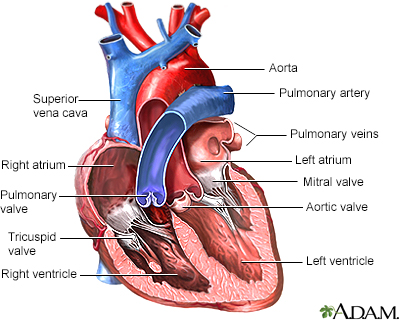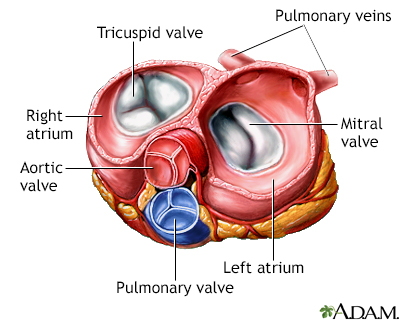Pregnancy SmartSiteTM
Valve replacement; Valve repair; Heart valve prosthesis; Mechanical valves; Prosthetic valves DefinitionHeart valve surgery is used to repair or replace diseased heart valves. Blood that flows between different chambers of your heart must flow through a heart valve. Blood that flows out of your heart into large arteries must also flow through a heart valve. These valves open up enough so that blood can flow through. They then close, keeping blood from flowing backward. There are 4 valves in your heart:
The aortic valve is the most common valve to be replaced. The mitral valve is the most common valve to be repaired. Only rarely is the tricuspid valve or the pulmonic valve repaired or replaced. DescriptionBefore your surgery, you will receive general anesthesia. You will be asleep and unable to feel pain. In open heart surgery, the heart surgeon makes a large surgical cut in your breastbone to reach the heart and aorta. You are connected to a heart-lung bypass machine. Your heart is stopped while you are connected to this machine. This machine does the work of your heart, providing oxygen and removing carbon dioxide. Minimally invasive valve surgery is done through much smaller cuts than open surgery, or through a catheter inserted through the skin. Several different techniques are used:
If your surgeon can repair your mitral valve, you may have:
If your valve is too damaged, you will need a new valve. This is called valve replacement surgery. Your surgeon will remove your valve and put a new one in place. The main types of new valves are:
In some cases, surgeons can use your own pulmonic valve to replace the damaged aortic valve. The pulmonic valve is then replaced with an artificial valve (this is called the Ross Procedure). This procedure may be useful for people who do not want to take blood thinners for the rest of their life. However, the new aortic valve does not last very long and may need to be replaced again by either a mechanical or a biologic valve. Related topics include:
Why the Procedure Is PerformedYou may need surgery if your valve does not work properly.
You may need heart valve surgery for these reasons:
Some of the heart valve problems treated with surgery are:
RisksThe risks of having heart surgery include:
It is very important to take steps to prevent valve infections. You may need to take antibiotics before dental work and other invasive procedures. Before the ProcedureYour preparation for the procedure will depend on the type of valve surgery you are having:
After the ProcedureYour recovery after the procedure will depend on the type of valve surgery you are having:
The average hospital stay is 5 to 7 days. The nurse will tell you how to care for yourself at home. Complete recovery will take a few weeks to several months, depending on your health before surgery. Outlook (Prognosis)The success rate of heart valve surgery is high. The operation can relieve your symptoms and prolong your life. Mechanical heart valves do not often fail. However, blood clots can develop on these valves. If a blood clot forms, you may have a stroke. Bleeding can occur, but this is rare. Tissue valves last an average of 12 to 15 years, depending on the type of valve. Long-term use of blood thinning medicine is most often not needed with tissue valves. There is always a risk for infection. Talk to your health care provider and surgeon before having any type of medical procedure. The clicking of mechanical heart valves may be heard in the chest. This is normal. ReferencesCarabello BA, Kodali S. Valvular heart disease. In: Goldman L, Cooney KA, eds. Goldman-Cecil Medicine. 27th ed. Philadelphia, PA: Elsevier; 2024:chap 60. Herrmann HC, Reardon MJ. Transcatheter therapies for mitral and tricuspid valvular heart disease. In: Libby P, Bonow RO, Mann DL, Tomaselli, GF, Bhatt DL, Solomon SD, eds. Braunwald's Heart Disease: A Textbook of Cardiovascular Medicine. 12th ed. Philadelphia, PA: Elsevier; 2022:chap 78. Leon MB, Mack MJ. Transcatheter aortic valve replacement. In: Libby P, Bonow RO, Mann DL, Tomaselli, GF, Bhatt DL, Solomon SD, eds. Braunwald's Heart Disease: A Textbook of Cardiovascular Medicine. 12th ed. Philadelphia, PA: Elsevier; 2022:chap 74. Pellikka PA, Nkomo VT. Tricuspid, pulmonic, and multivalvular disease. In: Libby P, Bonow RO, Mann DL, Tomaselli, GF, Bhatt DL, Solomon SD, eds. Braunwald's Heart Disease: A Textbook of Cardiovascular Medicine. 12th ed. Philadelphia, PA: Elsevier; 2022:chap 77. Otto CM, Nishimura RA, Bonow RO, et al. 2020 ACC/AHA guideline for the management of patients with valvular heart disease: executive summary: a report of the American College of Cardiology/American Heart Association Joint Committee on clinical practice guidelines. Circulation. 2021;143(5):e35-e71. PMID: 33332149 pubmed.ncbi.nlm.nih.gov/33332149/. Rosengart TK, Aberle CM, Ryan C. Acquired heart disease: valvular. In: Townsend CM Jr, Beauchamp RD, Evers BM, Mattox KL, eds. Sabiston Textbook of Surgery. 21st ed. Philadelphia, PA: Elsevier; 2022:chap 61. | ||
| ||
Review Date: 5/13/2024 Reviewed By: Mary C. Mancini, MD, PhD, Cardiothoracic Surgeon, Shreveport, LA. Review provided by VeriMed Healthcare Network. Also reviewed by David C. Dugdale, MD, Medical Director, Brenda Conaway, Editorial Director, and the A.D.A.M. Editorial team. View References The information provided herein should not be used during any medical emergency or for the diagnosis or treatment of any medical condition. A licensed medical professional should be consulted for diagnosis and treatment of any and all medical conditions. Links to other sites are provided for information only -- they do not constitute endorsements of those other sites. No warranty of any kind, either expressed or implied, is made as to the accuracy, reliability, timeliness, or correctness of any translations made by a third-party service of the information provided herein into any other language. © 1997- A.D.A.M., a business unit of Ebix, Inc. Any duplication or distribution of the information contained herein is strictly prohibited. | ||


 Heart - section th...
Heart - section th... Heart - front view
Heart - front view Heart valves - ant...
Heart valves - ant... Heart valves - sup...
Heart valves - sup...
